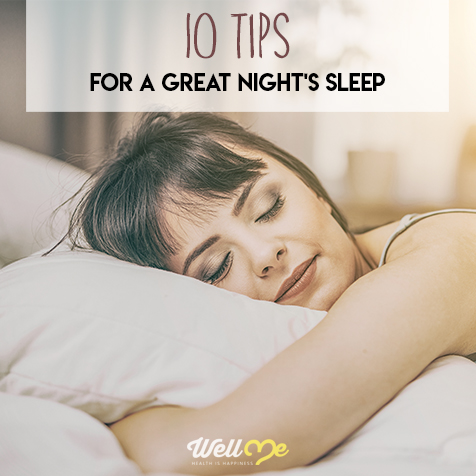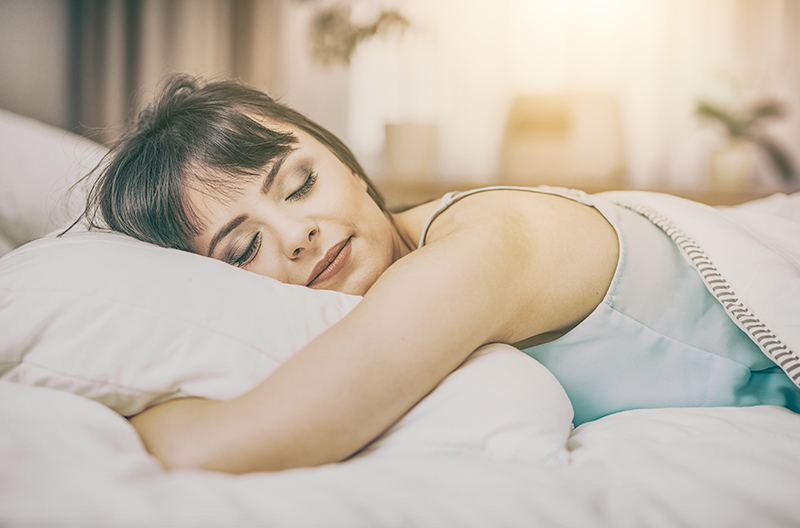One of the big buzzwords of our generation is “sleep.” People in the 21st century simply aren’t getting enough of it. Sleep is incredibly important for our everyday function and makes a huge difference in our survival, health, and well-being.[1]
Indeed, sleep can make a huge difference in how we feel, and a “sleep debt” can be highly problematic. Insomnia is a common complaint among many adults yet getting very little sleep at night is a badge of honor, in a way. It’s time to take a good look at our health and wellness and start getting some sleep.
Consistency is Key
Your body has something called a “circadian rhythm” which is its way of timing itself for the daytime and nighttime hours. It is constantly recalibrating, so it can time perfectly with your normal hours, so if your hours of waking up and going to bed are constantly changing, it will never quite settle in. For you, that means you’ll have a harder time falling asleep.
This is especially tricky for most people on weekends since that’s the time they get to “catch up” on sleep. In reality, however, it is healthier to wake up (and, ideally, go to bed) at the same time every morning so that your body gets completely used to it and sticks with it. If you stay up late one night, try not to disrupt your entire sleep schedule because of it, as that will have a more detrimental effect on your future sleep than just having one sleepy day.[2]
You’ll be surprised to see how effective it is to wake up and go to bed at the same time every day. After a few weeks, it’s possible that your body will start waking up naturally, without an alarm at all. If you’re waking up naturally, it’s a good sign you’re on the right track to healthy sleep.
Your Eating Habits Matter

While you’re probably already aware that simply “being healthy” helps with sleep (which everyone knows includes exercise and eating well), did you know that what you eat directly before bed can have an immense effect on your quality of sleep? Even though eating a heavy meal makes a lot of people sleepy, for example, it is actually not recommended to go to bed just a couple hours after eating a large meal. It makes it harder to fall and stay asleep.
The same goes for alcohol, which also has a similar kind of effect on sleepiness. It might make you drowsy and think you’re going to fall asleep better because of it, but it also will make it less likely that you’ll stay asleep — which is half the battle.
If you have sleeping problems, you’re probably already well aware that caffeine in the late afternoon or evening is not recommended. It can disrupt your restfulness for several hours, so you might even want to try stopping consuming caffeine a couple hours earlier than you normally would to see if that helps.
Create the Optimal Environment
Sometimes the room you’re sleeping in can make a big difference in your quality of sleep. The light, sound, and temperature are all important factors – an ideal room for sleeping is cool but not cold, dark, and quiet.
You might want to get darkening shades for your windows or wear an eye mask to ensure it is dark enough. Using essential oils for sleep will also help you to get a restful night. If earplugs work for you and you’re in a noisy environment for whatever reason, use those every time you go to sleep. Sometimes turning on a fan just for the noise (or for the pleasant breeze) can make a big difference in promoting better sleep.
Don’t Take Naps (That Are Too Long)
Okay, before skipping this step out of pure distaste, give us a chance. We know that napping is glorious and can make a person wake up feeling refreshed and ready for the day. This is particularly true of “power naps,” which are short naps (20 or 30 minutes or less) and they can help your brain work better during the day.
So, you don’t have to give up naps altogether. You should, however, ditch the long naps, especially if you only take them once in a while. If you take a long nap on an irregular basis, however, this is going to do more harm than good to your daytime wakefulness and your nighttime sleepiness.
It’s important to remember here that every individual is different, so even if your friend or partner seems to sleep perfectly fine at night, takes long daytime naps, and is perfectly alert during the day, that does not mean it should work for you or anyone else.
Fun Fact: There’s a reason they’re called “power naps.” Short naps during the day can enhance your brain function and make you feel better rested and more alert during the day without harming your sleep at night. Long naps, on the other hand, can do more harm than good.
Do Some Exercise
Exercise is important for your health in countless ways, and your quality of sleep is one of them. Numerous studies have shown that exercise during the day (never right before bed, however) can make a huge difference in falling and staying asleep. In fact, it has been found that exercising regularly makes a bigger difference than most of the sleeping pills that are on the market.[3]
Remember that exercise stimulates and makes you more alert, so it’s not generally encouraged to do it after dark — of course, this also depends on the individual.
Address Your Stress

Have you ever laid down to go to sleep only to find a mental list of your concerns, worries, and incomplete tasks starts to form? Of course you have! This happens at least on occasion to just about everybody.
One of the ways to combat this is to deal head-on with the things stressing you out. Some people journal before bed, others make lists, and still others simply make sure their day is more organized. Another option is meditation, as oftentimes this mental list comes out of your feelings of anxiety rather than actual things that need doing right then.
Evaluate Your Bed
In addition to making sure the space you’re sleeping in is set up for good sleep, make sure the object you’re sleeping on is also adequate. That includes your bed frame, mattress, and pillows. If you’ve been using the same one for more than 10 years, it’s probably time to switch to a new one. Not only should your mattress and pillows be comfortable, they should be supportive, too. Be sure that there are no allergens inside the products either, as this would surely disrupt your sleep.
There is no “one size fits all” solution to a supportive mattress and pillow – all that matters is you find it comfortable. Although the up-front costs could be high, it’s worth it in terms of improving your sleep. One study showed that pain and stiffness decreased significantly, and sleep quality increased by 60% when using a new mattress.[4] In other words, don’t skimp out on a cheap mattress and pillow if you can help it.
Start a Nightly Routine (And Stick with It)
It’s sometimes hard to get your body to settle down and be prepared to go to sleep when your nighttime routine changes every day. If you’re having trouble sleeping at night, one very effective way to combat this is to establish a consistent winding down routine that you do every single night before bed. This is often done with babies and young children so they can prepare to fall asleep, and the same effectiveness applies to you — the only difference is that you have full control over this routine.
Oftentimes the best thing to do is have a routine that is specifically built for relaxation. This might include a massage, a hot bath, reading a book, listening to calming music, or meditating. There are tons of different relaxation techniques that you might find to be helpful — be sure to try one for a little while (a week or more) before deciding if it’s the right technique for you.
Read or Relax in Another Room
No matter what you do, sometimes there will just be nights where it is inexplicably difficult to fall asleep. When this happens, don’t lie there seething in anger or self-pity, or stress about the fact that you’ll be tired the next day. Instead, simply get out of bed, grab a book, and go to another room to read for a while.
It may feel counterproductive at the time — after all, getting out of bed seems like the last thing you should do. However, leaving the room in order to do something else is a good idea because the bedroom should only be associated with sleep and sex. Otherwise, you might associate doing something else (work, reading, writing) with your bed, which is not ideal for falling asleep when you get into it.
Make Your Daytime Brighter (And Your Nighttime Darker)
When we’re thinking about making our sleep better, it’s sometimes easy to forget that what we do during the day can have a huge effect on our sleep success at night. One of these aspects is light. Sometimes inadequate light during the day can have a negative effect on your quality of sleep at night.
Your body is keeping track of the kind of time without you realizing it. This is called your “circadian rhythm.” The circadian rhythm is your body’s reaction to the light-dark cycle of every day, and it is something that affects almost all species on earth.[5] Light affects a whole range of factors and systems running within your body, including your hormones.[6]

Of course, the most effective kind of light to have shining on you during the day is natural sunlight. Have you ever noticed that you naturally have more energy on a sunny day versus a cloudy one? This is no coincidence, as bright light tells your body it’s time to be fully awake now. This has the opposite effect on the nighttime hours, as if the more energetic you are during the day, the sleepier you are at night. Indeed, you will sleep longer and more deeply if the light during the day is improved.[7]
For the most effective “light therapy,” use blue-enriched white lights during your typical “office” hours. If this all sounds like a fairytale to you, consider the fact that patients suffering from insomnia actually saw an 83% improvement in how long it took them to fall asleep.[8] Doesn’t an 83% improvement sound pretty good to you?
Better yet, in another study of seniors, bright light exposure during the day led to the same number of hours of sleep. In this study that meant 2 hours of bright light during the day made for 2 extra hours of sleep at night – as well as better sleep efficiency of 80%.[9]
Although this research is mostly done on people who have significant sleeping problems, even the average Joe or Joanne can benefit from more efficient sleep. For some people, however, it just isn’t a realistic option to get a few hours of direct sunlight exposure every day. This may have to do with their work-life or what sort of climate they live in, for example. If that is the case, you can simply purchase a bright light fixture or bright light bulbs to use as you go about your normal routine.
One thing to note is that it’s important to switch it off when evening rolls around. Your body needs some time to start powering down and it can’t do that if it thinks it’s daytime up until you lie down to go to sleep. Blue light is one of the biggest problems, especially since this is the type of light emitted from smartphones, computers, and other such devices.
While it may not be possible to cut yourself off from your smartphone two hours before bed every night, you can take a few simple steps to remind your body that it’s nighttime. First, don’t watch TV within the two hours before you plan to go to sleep. If you find that you’re fiddling with your smartphone most of all, try downloading an app that specifically blocks blue light. If you don’t want to do that, or you absolutely must watch TV before bed, glasses can also be purchased that block blue light.
Summary: What Should You Do Now?
Having a nightly routine or improving the previous factors (eating habits, light, exercise, and relaxation techniques) is a really important way to improve your quality of sleep. If you’re having trouble sleeping and you haven’t incorporated all of them into your situation yet, it’s time to start now.
Think about your current habits and your main problems with sleeping. Do you have trouble falling asleep, and you often do late-night work on your bed? Or maybe you have trouble staying asleep and you often eat a big meal, drink a lot of water, or drink alcohol shortly before going to sleep.
Sometimes people do have diagnosable problems that should be treated, so if you are suffering from major sleep problems and these tricks don’t help, definitely check in with your doctor to see what other options are available.

Action Steps: Tips for improving your sleep today
- Choose one or two tips to incorporate into your daily routine, such as adding in bright light during the day or eating your big evening meal an hour earlier than usual.
- Don’t change everything at once, or else the big change in routine will actually make it harder to fall asleep at first. Do it gradually to make sure these are sustainable changes.
- Consistency is key. Try the same thing at the same time for several days in a row before deciding if it helps. Habits take a while to form, and your body takes time to adjust.
Just about everyone can benefit from getting better quality sleep. Many people feel like they fall and stay asleep fine, but they might be able to get more efficient sleep anyway. Once you’re sleeping better, you’re going to function better during the day — and who wouldn’t love that? Sleep tight!
References
- [1] “Information about Sleep.” NCBI. <https://www.ncbi.nlm.nih.gov/books/NBK20359/>
- [2] “Investigating the interaction between the homeostatic and circadian processes of sleep-wake regulation for the prediction of waking neurobehavioural performance.” NCBI. <https://www.ncbi.nlm.nih.gov/pubmed/12941057>
- [3] “Effect of acute physical exercise on patients with chronic primary insomnia.” NCBI. <https://www.ncbi.nlm.nih.gov/pubmed/20572421>
- [4] “Effectiveness of a selected bedding system on quality of sleep, low back pain, shoulder pain, and spine stiffness.” NCBI. <https://www.ncbi.nlm.nih.gov/pubmed/11896375>
- [5] “Overview of Circadian Rhythms.” NIH. <https://pubs.niaaa.nih.gov/publications/arh25-2/85-93.htm>
- [6] “The Circadian Cycle of Sleep and Wakefulness.” NCBI. <https://www.ncbi.nlm.nih.gov/books/NBK10839/>
- [7] “Blue-enriched white light in the workplace improves self-reported alertness, performance and sleep quality.” NCBI. <https://www.ncbi.nlm.nih.gov/pubmed/18815716>
- [8] “Alleviation of sleep maintenance insomnia with timed exposure to bright light.” NCBI. <https://www.ncbi.nlm.nih.gov/pubmed/8340561>
- [9] “Bright light treatment improves sleep in institutionalized elderly—an open trial.” NCBI. <https://www.ncbi.nlm.nih.gov/pubmed/12789673>
- Fun Fact Source: “Good sleep, bad sleep! The role of daytime naps in healthy adults.” NCBI. November 2006. <https://www.ncbi.nlm.nih.gov/pubmed/17053484>








